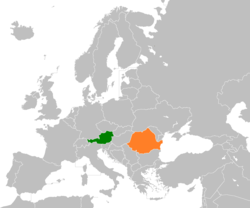This article needs additional citations for verification .(December 2022) |
 | |
Austria | Romania |
|---|---|
Austria-Romania relations refer to the diplomatic relations between Austria and Romania, which were established on September 23, 1878. [1] Austria, in the form of Cisleithania, a constituent and the dominant part of the Austro-Hungarian Empire, was the first country to recognize Romania's independence from Turkey, at the time the Ottoman Empire.
Contents
- History
- Diplomatic incidents
- Austria's veto of Bulgaria and Romania over Schengen Area accession and subsequent Romanian boycott of Austria
- Resident diplomatic missions
- See also
- References
- External links
Both countries are full members of the Council of Europe, Organization for Security and Co-operation in Europe and the European Union. Austria has an embassy in Bucharest, and two consulates in Constanța and Sibiu. Romania has an embassy in Vienna.
The relations were mostly based on the geopolitic context of the common history, including periods of hatred such as World War I, when the countries directly fought against each other, and periods of tolerance, cooperation and mutual liking, more often since the two countries joined the EU in 1995 and 2007, respectively.
In the present day, relations are at a low level and a mutual dislike sentiment is active between both Austrians and Romanians, due to numerous diplomatic disputes, most of them taking place after Romania's accession to the EU.



